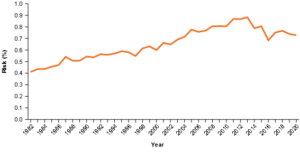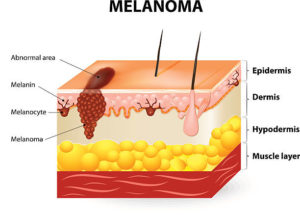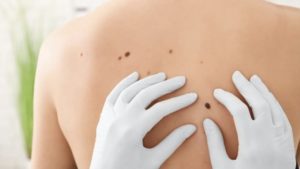Melanoma is the most serious type of skin cancer and Australia happens to be the capital of the disease.
- 1 Australian is diagnosed with Melanoma every 30 minutes.
- 1 Australian dies from Melanoma every 6 hours.
- Melanoma is the most common cancer for Australian ages 20 to 39.
- Melanoma is the second common cancer in Australian men; the third in Australian women.
Source: aihw.gov.au
Lifetime mortality risk, melanoma of the skin, persons

Source: National Mortality Database
What is Melanoma?
Melanoma is a form of skin cancer that develops when melanocytes – the skin’s pigment cell grow out of control. It is considered more deadly than non-melanoma skin cancers (i.e. squamous cell skin cancer and basal cell) because of the chance of it spreading to other parts of the body if it’s not caught early.

What Are the Risk Factors?
- Unprotected sun exposure
- A history of tanning and sunburn
- Lots of moles
- Past history of melanoma
- Past history of non-melanoma skin cancers, including BCCs and SCCs
- Fair skin, red hair, blue eyes or skin that burns easily
- Family history of melanoma
- Previous treatment for cancer including radiotherapy and chemotherapy
- Certain health conditions, such as Parkinson’s disease
What Are the Signs of Melanoma?
Cancer symptoms vary. Not all moles are malignant. But there are some clear signs that a mole could be a melanoma. You should get your moles checked by our professional GPs if you have noticed any of the following changes:
- Changing shape, particularly getting an irregular outline
- Changing colour, getting darker, becoming patchy or multi-shaded
- An existing mole getting bigger or a new mole growing quickly
- If a mole starts to itch or become painful
- If a mole is bleeding, becoming crusty and/or looks inflamed
Moreover, melanoma can occur anywhere you have melanocytes, even if they are not exposed to sunlight, i.e., folds between the toes, the skin underneath the fingernails and toenails, back of the eyes, etc. So it’s important to check your entire body regularly (once per month) for any changes or abnormalities.

How can WeCare help?
Like with all the other diseases, early detection is key. The estimated five-year survival rate of melanoma patients who get early-stage diagnosis and treatment is 98 percent; while others didn’t react in time until it spread to other organs, the survival rate drops further to only 23 percent.
Our experienced skin doctors provide detailed examination of any skin changes and a complete skin check. If any mole removal or skin lesion is advised, WeCare offers onsite skin clinic service with well-equipped treatment room and holistic post operative care.
Talk to our skin specialist today, schedule your regular skin checks.
Prevention and early detection save lives.




